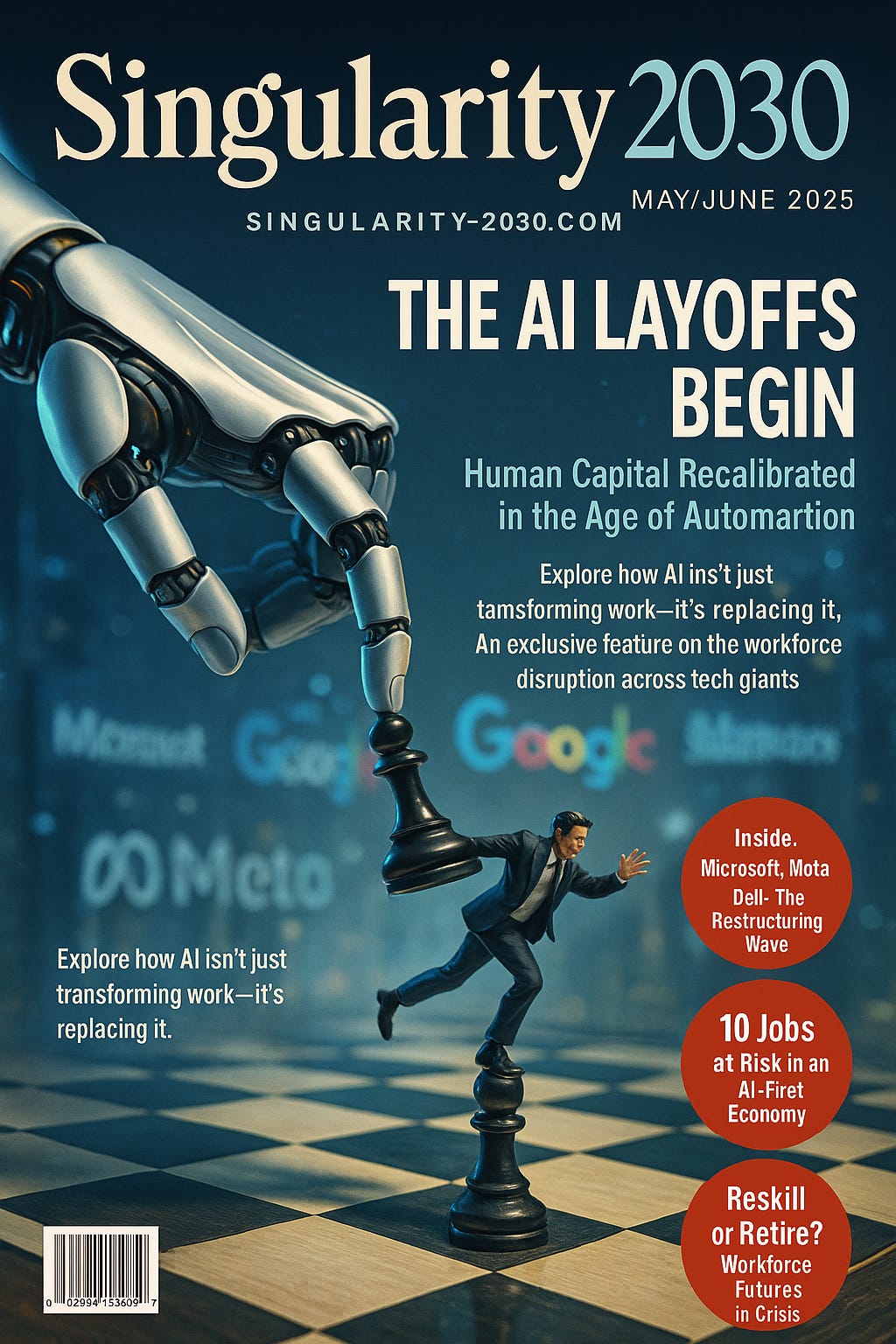The AI Layoffs Begin
A Sobering Shift in the Age of Automation
Introduction: A Paradox of Progress
Artificial Intelligence (AI), long celebrated as the harbinger of a brighter, more efficient future, is now revealing a darker side, the displacement of human workers at an accelerating rate. A recent infographic titled “The AI Layoffs Begin” paints a stark picture of how tech giants and influential enterprises are realigning their workforce not merely in the name of cost-cutting, but for AI-driven transformation.
While automation and AI bring unprecedented capability and productivity, they also mark a pivotal point of reckoning: what becomes of the human workforce in an AI-first world?
Wave of Layoffs: Who's Cutting and Why
Microsoft: ~6,000 Layoffs
Satya Nadella’s Microsoft has initiated one of the largest restructuring campaigns, targeting teams across Xbox, LinkedIn, and Azure. The reasoning? A strategic overhaul for AI alignment. The message is clear: Microsoft isn’t merely tightening its belt, it’s reforging its workforce to suit an AI-centric future.
Google (Alphabet): ~200 Cuts
Primarily affecting sales and operations, Google’s cuts also reflect a streamlining in favor of machine-optimized decision-making and operations.
PwC: 1,500 U.S. Employees Laid Off
The professional services firm has faced a performance dip, but beneath the surface lies the growing influence of AI in accounting, audits, and business intelligence, once bastions of human analytical labor.
Salesforce: ~1,000 Roles Eliminated
Marc Benioff’s company targets mostly non-technical roles, signaling the increased role of automation in customer engagement and backend operations.
Meta: 5% Workforce Cut
Mark Zuckerberg’s AI reorganization plan is slashing roles even in strategic departments. The company’s internal AI tools are being restructured, leading to human redundancy in both development and support functions.
Chegg: 22% Workforce Reduced
The ed-tech platform is one of the most AI-disrupted. With the rise of generative AI tutors like ChatGPT, Chegg is forced to reimagine its product and its people.
HP: ~2,000 Cuts
A response to dwindling PC sales, but also part of a longer-term shift toward cloud-based, AI-powered enterprise solutions, leaving traditional roles vulnerable.
IBM: Cutting “Non-Revenue Generating Roles”
IBM’s AI-centered transformation involves eliminating back-office roles as AI handles repetitive and rule-based tasks more efficiently.
Dell: ~12,000 Employees Let Go
As part of adapting to remote and cloud-based enterprise environments, Dell is embracing automation in support, logistics, and infrastructure teams.
Duolingo: 10% Layoff in Shift to “AI-First”
Even a learning platform with gamified charm isn’t immune. Duolingo is pivoting toward AI-generated curriculum and adaptive learning, requiring fewer human content developers.
Klarna: ~700 Jobs Cut
Recovering from overexpansion and leveraging AI in customer service and financial vetting, Klarna trims roles to automate core fintech functions.
The Common Thread: AI Is No Longer Just a Tool, It’s a Strategy
The narrative across these companies shares a consistent refrain: AI is not a supplementary innovation, it is becoming the central operating model.
While traditional corporate layoffs were often due to profit pressure or market contraction, this new wave is strategic, focused on realigning human capital to complement, or step aside for, AI capabilities.
A New Economic Epoch: Recurring Revenue vs. Redundant Roles
In parallel, companies are shifting to subscription-based and recurring revenue models powered by AI, where human roles in customer service, account management, and even tech support are replaced by smarter, faster, and cheaper AI systems.
From a business perspective, this makes sense. AI offers:
Scalability without burnout.
Predictability in costs.
Data-driven decision-making.
24/7 operational uptime.
But it raises fundamental ethical and societal questions:
Where will displaced workers go?
Will AI create more jobs than it destroys?
Can human creativity and empathy remain irreplaceable?
Conclusion: Adapt or Be Automated
The AI-driven layoff wave is not a cautionary tale, it’s a call to reskill, reposition, and reinvent. For professionals, adaptability is now a core survival skill. For companies, responsible AI deployment must be more than buzzwords, it must include clear strategies for human transition.
As AI’s capabilities continue to rise, so must our wisdom in guiding its integration, not as a replacement of people, but as an enhancement of our collective potential.
Next Issue Preview:
“Work in 2030: Will We All Be Freelancers, Coders, or Creators?”
Stay enlightened. Stay ahead.




